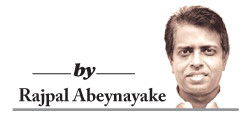 The beating heart of the nation? It used to be in the rolling hills, among the pukka sahibs of the plantations. That’s where the then spirit of the nation derived its sustenance, so that’s where the beating heart of the nation must have been.
The beating heart of the nation? It used to be in the rolling hills, among the pukka sahibs of the plantations. That’s where the then spirit of the nation derived its sustenance, so that’s where the beating heart of the nation must have been.
But, the beating heart of the nation is wherever we imagine it to be. It’s also where the shifting sands of time have made their imprint. Yesterday’s beating heart of the land was somewhere else, and sometimes in a matter of months it feels as if we have moved an eon.
Mrs. Sirimavo Bandaranaike decided the beating heart of the nation is among the hewers of wood and the drawers of water in the rural heartlands. But it was not to be.
J. R. Jayewardene made his entry with a thunderclap, and hitched his wagon to the Reaganite and Tatchertite forces of transformation, and those capitalist-roader fads that were rampant in the 80s. Imagine that the clock never turned back after that for the entire world, not just Sri Lanka.
Give the departed Old Fox his due, the man surely knew how to read the tea leaves didn’t he? How was it that he guessed not only that it’s time unbridled capitalism took hold in Sri Lanka, but that it would never be the same again, and there was no going back to Mrs. Bandaranaike’s type of austerity and self-sustenance ever?
Does that mean that the beating heart of the nation that was in the rural hinterland suddenly came lurking over to the factory, where impressionable and the palpably impoverished young working girls toiled to establish the new regimen under the new boss’s regime?
LOCATION
But why is it important to define the nation in this way? Isn’t it all in people’s minds, and each to his own? Unfortunately this is never how it has been. The so-called frontier mentality for instance, defined the eras that established new countries.
Can that be denied? Hardly. It will take an extremely brave person to claim that the frontier era was about anything other than establishing new outposts in ancient tribal land that essentially belonged to other people.
But everything moves with the shifting sands of time, and that’s why it becomes important to arrive at that definition of where we are headed. At this given time maybe our future direction is unclear. Perhaps many would say we are at the crossroads.
But ten years from now history would look at things differently. Historians would have no compunctions about fitting us in a particular historical location that was defined by the peculiarity of this period. They may even say this was the era in which the country turned the page. Or they may say that this was the era of the missed opportunity. It’s probably that we are trying desperately to locate the beating heart of the nation.
It’s probably located through the eyes of the dreamers who in spite of everything that people insisted around them, set the nation on a trajectory of their own making. People’s insistence may be that we reform the old systems and change the old guard.
But the dreamers may have other ideas. The dreamers in overtly socialistic societies didn’t like the insistence on regimentation. The reader may have heard the old saw about the dog that moseyed over from East Germany to the West during the long running Cold War.
He met an old West German pooch at the fire-hydrant, and that hoary old specimen insisted on asking the East German four legged friend how things were in Berlin?
Everything is fine said the red beret sporting comrade pooch. We are well fed in the East, says the pooch, and the sausages are as big as Christmas stockings, and it’s all courtesy the State.
Really, exclaims the free-world counterpart. In which case, what gives? What brings you this way asks the West German pooch, suppressing the faintest of growls.
Oh that, says the comrade from the East, and let’s call him Lika. Lika smiles and says “Why, I came here to bark.”
Alas, with apologies to all comrades, the beating heart of Germany was not in the commune or even in the factory that insisted on those State sponsored Christmas stocking sized sausages.
It was across the wall that had to be torn down. To say this is not to write an ode to capitalism. But nine times out of ten it’s the people that decide where the beating heart of the nation is, or will be.
Sometimes, it’s a top down imposition as people learnt far too late in Hitler’s Germany or Mussolini’s Italy.
It’s fair to say that the Sri Lankan people decided that however iconoclastic Mrs. Bandaranaike’s movement for self-sufficiency may have been that it was not where they would wish to locate their collective futures. In short rulers may be convinced of the direction in which they may be taking the country, but the ruled always have other ideas.
The modish term for any of this is zeitgeist. The word is described in the dictionary as the ‘defining spirit or mood of a particular period in history.” What would be the mood and sprit of this particular period in history we are currently passing?
STANDARD
People have vague ideas about how it would all turn out after the interim period that all agree we are going through meanders to an end. But would the interim become more permanent? The zeitgeist is zeitgeist because everything is in a permanent state of flux, a maaya as those steeped in Buddhist and Vedic teachings would probably tell you.
What is hidden in the picture that we are seeing today, of a nation that has lost its bearings but is hoping to emerge in something of a daring new incarnation?
Cynics would say we have been here before, and that there was always this sense of hope after the several periods of war that punctuated our lives in the past few decades.
Is something more era or epoch defining on the cards, however? By definition would we have a mood and a time that would not be entirely transient? That would be a difficult supposition to make for those who are convinced our goose is already cooked.
The economic meltdown they say made an indelible mark. We are now cast away in rough seas they surmise, and have little control over our destinies when the forces that keep our vessel afloat are not anywhere near our own control.
But yet, many countries have been here before. Some were war ravaged and laid waste, and once upon a time, facing international opprobrium for the greater part too. Japan is the standard go-to example, if anyone has any doubts about the value of resilience against the odds.
Inevitable answer
We also know the inevitable answer of the majority of us who’d react to any such suggestion. We are no Japan, they would say. But yet there never has been such a pregnant pause in the affairs of a nation. If the zeitgeist is in the shifting sands of time, what happens when time itself seems to stand still?
It’s what we seem to experience now. It’s something of a collective national period in waiting, whence the contours of a near and long term future are being imagined.
But yet, that’s where we began, by supposing the zeitgeist is all in our minds, in the collective national imagination. True that may sound contrived or bombastic even, but national aspirations are better imagined in epic terms. What’s epic in a way is that we survived all that we did, the multiple wars and insurgencies, the harrowing mind-numbing senselessness of the violence, and the utter economic depredation that followed.
But it seems these nightmares of the past lent no time for reflection. Now, for once, there seems to be a time to ruminate over our follies, and take stock of our long record of missteps. It’s a limbo we can surely put to good use.




